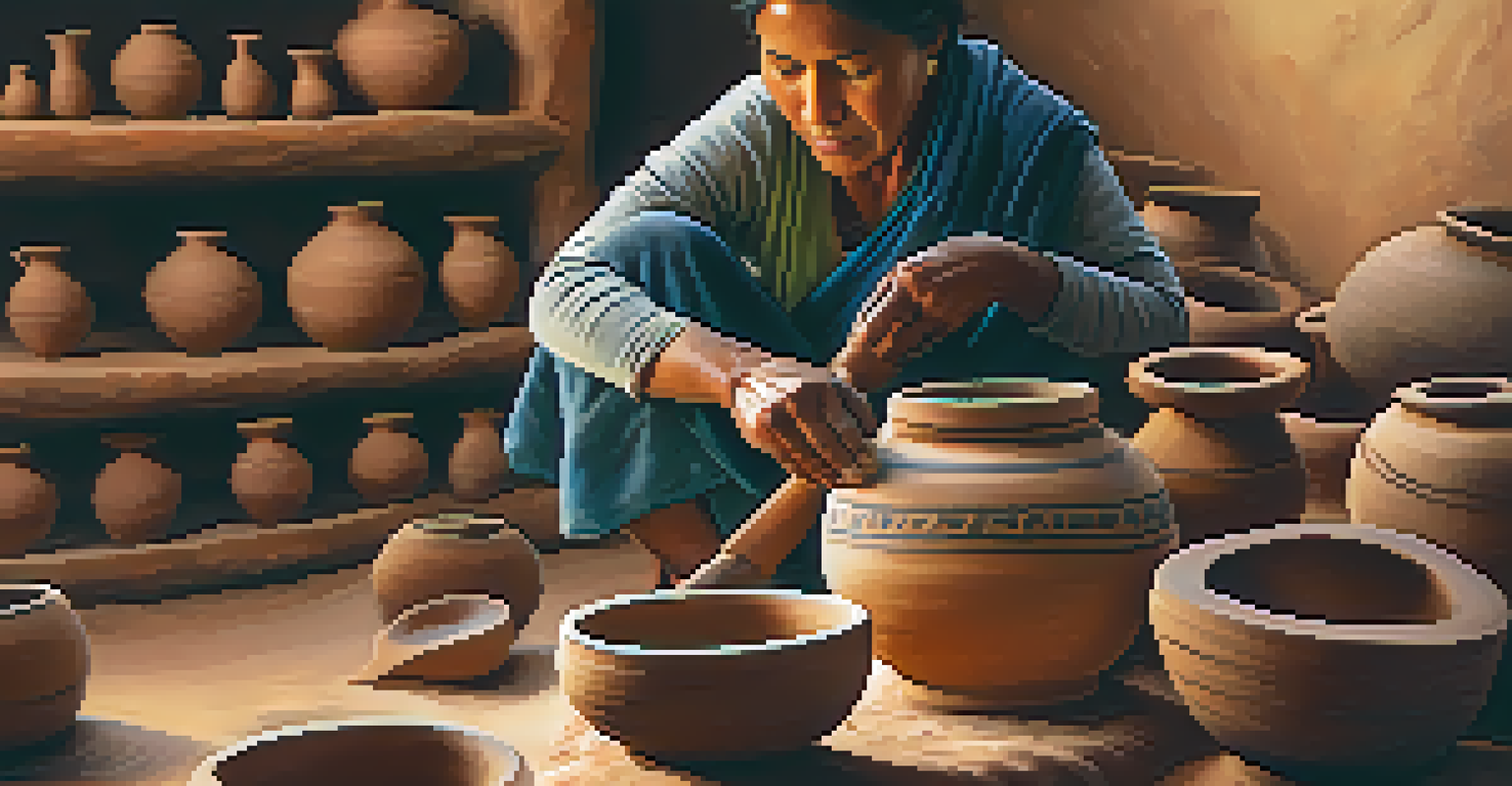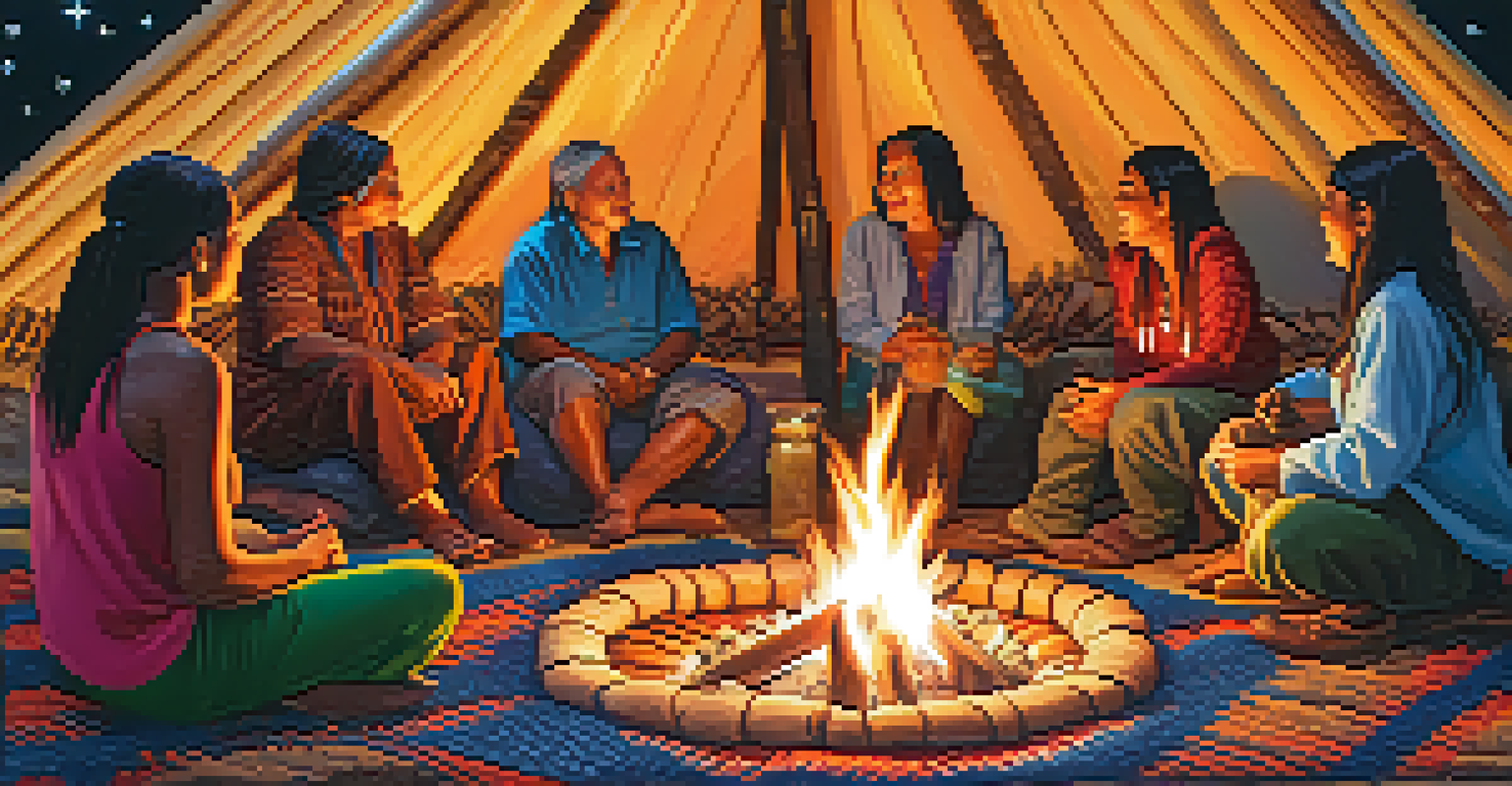Cultural Ecotourism: Engaging with Indigenous Communities

Understanding Cultural Ecotourism and Its Importance
Cultural ecotourism is a travel model that emphasizes respect for local cultures and the environment. It allows travelers to experience the authentic traditions of Indigenous communities while promoting sustainable practices. This approach not only enriches the travel experience but also supports the preservation of unique cultural heritages.
Traveling – it leaves you speechless, then turns you into a storyteller.
By engaging with Indigenous communities, tourists gain insights into their ways of life, beliefs, and customs. This not only broadens the traveler’s horizons but also fosters meaningful connections between people from different backgrounds. In essence, cultural ecotourism serves as a bridge, allowing for dialogue and understanding.
Moreover, the significance of cultural ecotourism lies in its potential for economic empowerment. Many Indigenous communities rely on tourism as a source of income, which can reduce poverty and encourage the preservation of their cultural identity. By participating in these experiences, travelers play a role in sustaining these communities.
Benefits of Engaging with Indigenous Communities
Engaging with Indigenous communities through ecotourism has numerous benefits for both visitors and hosts alike. For travelers, it offers a chance to learn about traditional ecological knowledge and sustainable practices directly from the source. This firsthand experience can lead to a deeper appreciation for the environment and its preservation.

For Indigenous communities, sharing their culture with visitors can instill a sense of pride and validation. It empowers them to tell their stories and showcase their traditions. Additionally, it provides a platform for cultural exchange, where visitors can learn and Indigenous people feel valued.
Cultural Ecotourism Empowers Communities
By engaging with Indigenous communities, cultural ecotourism helps preserve their cultural heritage while providing economic support.
Furthermore, the economic benefits can be substantial. When tourists participate in excursions or workshops led by Indigenous people, the revenue generated often stays within the community. This creates jobs and supports local artisans, ensuring that the cultural heritage is not only preserved but also thrives.
Ethical Considerations in Cultural Ecotourism
While cultural ecotourism offers many advantages, it also raises ethical considerations that travelers should be aware of. It's crucial to approach these experiences with sensitivity and respect, understanding that Indigenous cultures are not mere attractions but living, breathing entities. This means being mindful of how you interact and the impact of your presence.
The greatest legacy we can leave our children is happy memories.
Travelers should prioritize engaging with community-led initiatives. This ensures that the benefits of tourism directly support the local population rather than exploiting their culture. It's also important to seek permission before photographing or sharing aspects of their culture, as some traditions may be sacred and not meant for public display.
Additionally, being aware of the potential for cultural commodification is vital. As demand for cultural experiences grows, there’s a risk that Indigenous practices may be altered to cater to tourists. By promoting responsible tourism, travelers can help preserve the authenticity and integrity of Indigenous cultures.
Sustainable Practices in Cultural Ecotourism
Sustainability is at the heart of cultural ecotourism, intertwining environmental conservation with cultural preservation. Many Indigenous communities have long practiced sustainable living, and travelers can learn from their wisdom. Engaging in activities like guided nature walks or workshops on traditional farming methods helps promote these sustainable practices.
In addition to learning, tourists can actively contribute to environmental efforts by participating in conservation projects. These initiatives, often organized by Indigenous communities, aim to protect local ecosystems while providing visitors with a hands-on experience. This not only benefits the environment but also reinforces the bond between travelers and the community.
Ethical Travel Requires Sensitivity
Travelers must approach cultural ecotourism with respect and awareness, ensuring their interactions support and honor Indigenous cultures.
Furthermore, sustainable tourism practices, such as minimizing waste and supporting local businesses, can enhance the traveler’s experience. When visitors commit to eco-friendly choices, they contribute to the well-being of the community and the preservation of its cultural heritage. This creates a win-win situation for everyone involved.
Cultural Experiences: What to Expect
When engaging in cultural ecotourism, travelers can expect a variety of immersive experiences. These might include participating in traditional ceremonies, learning to create local crafts, or joining in communal meals. Each interaction is an opportunity to connect and understand the culture on a deeper level.
Visitors might also encounter storytelling sessions where elders share tales of their history and values. Such narratives not only entertain but also impart essential life lessons, fostering a greater appreciation for the community's heritage. This engagement can leave a lasting impact on travelers, inspiring them to reflect on their own cultural identities.
Moreover, the chance to witness Indigenous practices firsthand—be it through dance, music, or art—offers a unique glimpse into their worldview. These experiences are often enriched by the community’s hospitality, making travelers feel welcomed and valued. The emotional connections formed during these interactions can transcend the boundaries of culture.
Promoting Cultural Sensitivity as a Traveler
Cultural sensitivity is essential when participating in cultural ecotourism. Travelers should educate themselves about the customs and values of the Indigenous community they plan to visit. This preparation fosters respect and shows a genuine interest in their culture, enhancing the overall experience.
Moreover, being open to learning and adapting to local norms is crucial. Simple gestures, such as following dress codes or participating in rituals, can demonstrate respect for the community's traditions. It's about being an active participant rather than a passive observer.
Sustainability is Key to Success
Integrating sustainable practices in cultural ecotourism not only aids environmental conservation but also enriches travelers' experiences.
Additionally, engaging in conversations with community members about their experiences can deepen your understanding. Asking questions and listening actively fosters a respectful dialogue. This kind of cultural exchange enriches the travel experience for both parties and promotes mutual respect.
The Future of Cultural Ecotourism
The future of cultural ecotourism looks promising as more travelers seek authentic experiences. As awareness of the importance of respecting Indigenous cultures grows, so does the demand for responsible tourism options. This shift can lead to greater collaboration between travelers and local communities.
Furthermore, advancements in technology can enhance these experiences. Virtual reality and digital storytelling can offer insights into Indigenous cultures before travelers even arrive, fostering a deeper appreciation. This integration of technology can also help communities share their stories with a broader audience.

Ultimately, the goal is to create a sustainable model that benefits Indigenous communities while enriching the lives of travelers. As we move forward, prioritizing ethical practices and cultural sensitivity will be vital in ensuring that cultural ecotourism continues to thrive harmoniously with Indigenous cultures.